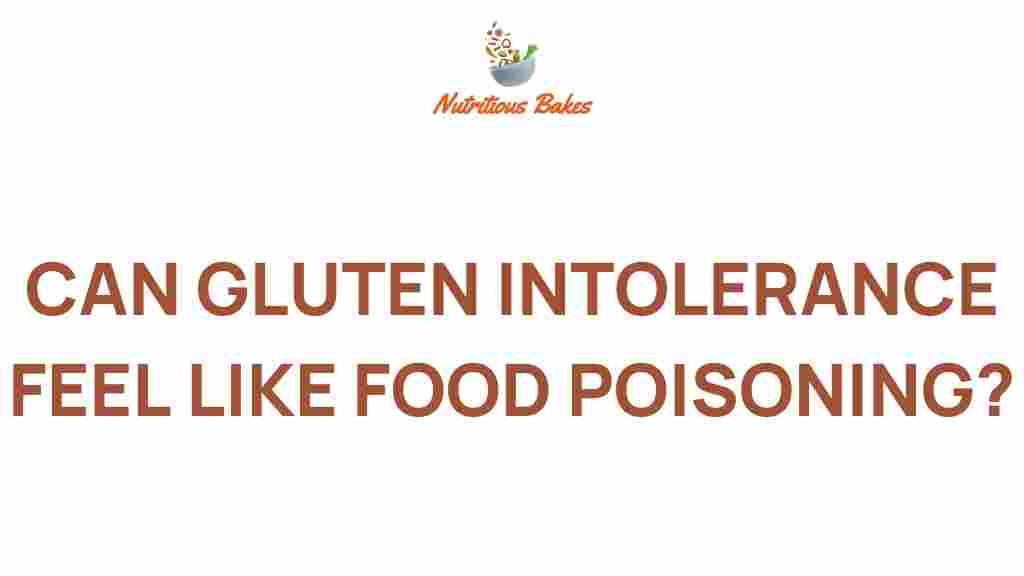Unmasking Gluten Intolerance: A Hidden Culprit Behind Food Poisoning?
In recent years, gluten intolerance has gained significant attention as more people report adverse reactions to foods containing gluten. While many may associate gluten intolerance primarily with digestive issues, its connection to food poisoning is less understood. This article aims to explore gluten intolerance, its symptoms, and how it may be a hidden culprit behind food poisoning experiences. We will also discuss dietary changes, the importance of recognizing hidden allergens, and tips for maintaining digestive health.
Understanding Gluten Intolerance
Gluten intolerance, also known as non-celiac gluten sensitivity (NCGS), is a condition where individuals experience various symptoms after consuming gluten—a protein found in wheat, barley, and rye. Unlike celiac disease, which involves an autoimmune response, gluten intolerance does not cause damage to the intestines. However, the symptoms can be equally distressing and may mimic those of food poisoning.
Symptoms of Gluten Intolerance
Individuals with gluten intolerance may experience a range of symptoms, including:
- Abdominal pain
- Bloating
- Diarrhea or constipation
- Fatigue
- Headaches
- Joint pain
- Skin rashes
- Brain fog
These symptoms can vary in intensity and may occur immediately or hours after consuming gluten-containing foods. Recognizing these symptoms is crucial for those suspecting gluten intolerance, as they can often be mistaken for food poisoning.
How Gluten Intolerance Relates to Food Poisoning
Food poisoning is typically associated with the consumption of contaminated food or drinks, leading to gastrointestinal distress. However, gluten intolerance can mimic these symptoms, making it difficult to distinguish between the two conditions. Here’s how they relate:
- Overlapping Symptoms: Both gluten intolerance and food poisoning can cause abdominal pain, diarrhea, and nausea. This overlap can lead to misdiagnosis.
- Triggers: Some individuals with gluten intolerance may react to certain foods that are also common sources of food poisoning, such as improperly prepared grains or cross-contaminated foods.
- Delayed Reactions: Symptoms of gluten intolerance can appear hours or even days after consuming gluten, while food poisoning symptoms usually manifest within hours. This delay can confuse individuals trying to identify the cause of their symptoms.
Maintaining Digestive Health
For those struggling with gluten intolerance, maintaining digestive health is paramount. Here are some strategies to consider:
- Identify Trigger Foods: Keep a food diary to track what you eat and any symptoms that follow.
- Consult a Healthcare Professional: Work with a nutritionist or doctor to better understand your condition and receive tailored advice.
- Consider a Gluten-Free Diet: Many people find relief by eliminating gluten from their diets, leading to improved overall wellness.
- Stay Hydrated: Proper hydration can help alleviate some digestive symptoms.
Dietary Changes for Gluten Intolerance
Making dietary changes can significantly impact individuals with gluten intolerance. Here are some steps to follow:
- Elimination Phase: Remove all gluten-containing foods from your diet for at least 4-6 weeks.
- Reintroduction Phase: Gradually reintroduce gluten-containing foods one at a time to observe any reactions.
- Read Labels: Be vigilant about reading food labels to avoid hidden allergens. Gluten can be present in many processed foods.
- Focus on Whole Foods: Incorporate more fruits, vegetables, lean proteins, and gluten-free grains like quinoa and rice into your diet.
Troubleshooting Gluten Intolerance
If you suspect gluten intolerance but are still experiencing symptoms after making dietary changes, consider the following troubleshooting tips:
- Cross-Contamination: Ensure that gluten-free foods are not contaminated with gluten during preparation.
- Check for Hidden Allergens: Some foods may contain gluten in unexpected forms, such as sauces or dressings. Always check ingredient lists.
- Evaluate Other Dietary Factors: Other food intolerances, such as lactose intolerance or FODMAP sensitivity, could be contributing to symptoms.
- Seek Professional Help: If symptoms persist, consult a healthcare provider for further evaluation and testing.
The Importance of a Gluten-Free Diet
A gluten-free diet is essential for those diagnosed with gluten intolerance. Here’s how a gluten-free lifestyle can enhance your well-being:
- Improved Digestive Health: Eliminating gluten can lead to a decrease in gastrointestinal symptoms.
- Increased Energy Levels: Many individuals report increased energy after removing gluten from their diets.
- Enhanced Nutritional Profile: A gluten-free diet often encourages the consumption of whole foods, which can improve overall nutrition.
For more detailed information on gluten-free diets, you can visit the Celiac Disease Foundation.
Conclusion
Gluten intolerance can be a hidden culprit behind symptoms that are often mistaken for food poisoning. Understanding the nuances of gluten intolerance, recognizing its symptoms, and making appropriate dietary changes are essential steps toward improving digestive health and overall wellness. By taking proactive measures to identify hidden allergens and focusing on a gluten-free diet, individuals can significantly enhance their quality of life. If you suspect you are suffering from gluten intolerance, consider consulting a healthcare professional for personalized guidance and support.
For more tips on nutrition and wellness, check out our wellness blog.
This article is in the category Tips and created by NutritiousBakes Team
